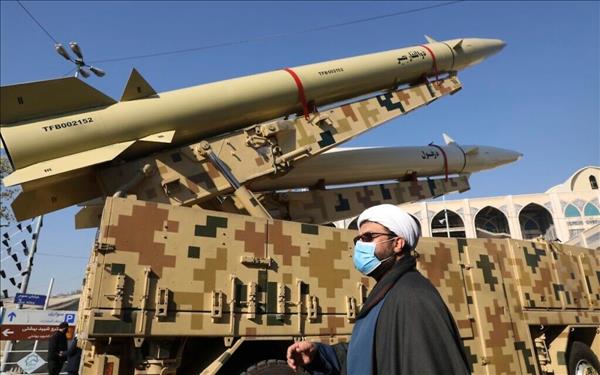
Iran Missile Deliveries Could Tilt War In Russia's Favor
It has been reported that Iran is preparing to transfer short-range ballistic missiles to Russia for use against targets in Ukraine, of 1,000 additional weapons of unspecified type.
Iran has allegedly already transferred a number of unmanned aerial vehicles (UAVs) to Russia. Many of these drones have been used in Ukraine, although the Islamic Republic involvement.
I have researched under sanctions, as well as for its own weapons programs. This has led me to believe that the transfer of these systems, while allowing Russia to continue to inflict horrendous death and destruction against civilian populations and infrastructure in Ukraine, is unlikely to change the overall strategic balance.
Iranian“kamikaze” drones have been involved in and other targets in recent weeks. Members of the Islamic Revolutionary Guard Corps – an Iranian paramilitary unit – Crimea to assist in operating the systems.
Missiles for Moscow?The Fateh-110 and Zolfaghar ballistic missiles allegedly being prepared for transfer by Iran to Russia are based on different technology to these UAVs already transferred. The range of the missile systems is shorter than those of the UAVs ( as opposed to alleged of the Shahed-136 UAV, for example).
But ballistic missiles travel at much higher speeds (often measured in km/second rather than km/hour). This makes defending against these systems and the explosive warheads they carry much more challenging – if not impossible – for Ukrainian forces with current capabilities.
Ukraine has reported it has been able to intercept of the propeller-driven Iranian UAVs using a mixture of fighter aircraft, air defense systems and even small arms fire. They would not be able to achieve anything like this success rate against ballistic missiles.
The Fateh-110 and Zolfaghar have similar characteristics as those ballistic missiles by Russia during the conflict to date, namely speed and ability to penetrate air defenses.
Why seek Iranian support?This is not the first time that Iran has transferred its missile technology to overseas customers. Since the 1980s the country has had a bilateral relationship with North Korea where technology has at some points . It has also provided missiles to and more recently to in Yemen.
But, despite a long history of political and commercial relations with Tehran, Russia is a new market for Iranian missile technology, and an unusual one given Russia's vast military industrial complex. But the conflict in Ukraine has continually of Russia's perceived capabilities on the battlefield and in its weapons factories.
In seeking Iran's support, Russia is likely trying to replenish stocks of missiles expended so far during the conflict, with suggesting that its arsenal may be depleted in certain areas. It is also trying to offset some of the challenges faced by the Russian defense industrial complex's efforts to replenish stocks.
Russia's weapons manufacturers are stretched to the limit by efforts to restock. The country also faces a wide-ranging arms embargo, which for many western states dates back to the 2014 seizure of Crimea or before, and tightened in February this year.

Iran's Fateh-110 surface-to-surface missile is headed to Russia. Picture: Hossein Velayati / Wikimedia / CC BY 4.0
Russia has likely used illicit procurement networks – many run by Russian and before that – and long-practiced tactics such as the use of to try to get around these restrictions. Western intelligence efforts have long tried to track these networks, occasionally obtaining insights into Russian technologies.
The insights provided by wreckage recovered from Ukraine, however, have been unprecedented. Remains of Russian weapons systems – missiles, drones, electronic warfare and other land systems – have been found to be rich in western technology illicitly procured from the international marketplace.
The same is true for , 300 of which have been according to Ukrainian president Volodymyr Zelensky.
Besides Russia's need for weaponry, there are clearly political and diplomatic considerations for Vladimir Putin. Russia is highly isolated, and international political support for Moscow is coming from .
So Russia has turned to Iran and a small number of other countries on the periphery of the international system such as North Korea, which is artillery ammunition to replenish Russian stocks.
While providing political benefits for Russia and reducing its isolation, the deal also brings economic benefits for Iran, which has faced significant international sanctions over the past decades, due to its nuclear program. For both countries, then, bilateral trade will highly beneficial. Russia is thought any further UN sanctions against Iran.
What can be done?The proliferation of Iranian ballistic missiles into the European theater is not good news. Use of weapons on the battlefield can provide vendors a useful opportunity to test systems in new operational contexts, and could potentially act as a marketing opportunity to showcase these systems to other potential customers.
There are no easy options for countering these arms transfers. This will be especially true if the missiles can be delivered by air supplied by Iran appear to have been. Direct flights provide no opportunities for interdiction.
The US have imposed asset freezes, restrictions on travel and other business activities against Iranian drone manufacturers and operators – and may take new and further measures. They have efforts to disrupt Iran's networks.
We may also see the US used in the past to get at parts of these transnational networks based overseas. This includes sting operations, civil asset seizures and information operations. Essentially, the“cat and mouse” game between the US and its allies and Russia and its suppliers will continue – but with new targets and heightened energy.
is Senior Research Fellow at the Center for Science and Security Studies,
This article is republished from under a Creative Commons license. Read the .

Legal Disclaimer:
MENAFN provides the information “as is” without warranty of any kind. We do not accept any responsibility or liability for the accuracy, content, images, videos, licenses, completeness, legality, or reliability of the information contained in this article. If you have any complaints or copyright issues related to this article, kindly contact the provider above.






















Comments
No comment